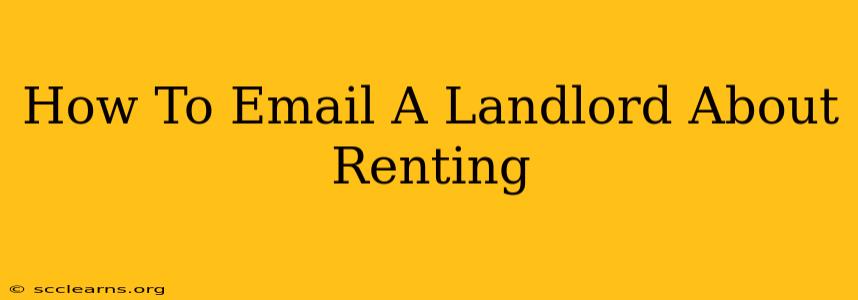Landing your dream rental property often hinges on the first impression you make. A well-crafted email to a landlord can significantly increase your chances of securing a viewing and ultimately, the lease. This guide provides a step-by-step approach to writing an email that stands out from the competition.
Before You Hit Send: Gathering Essential Information
Before composing your email, gather the necessary information. This crucial groundwork ensures a professional and efficient communication process.
1. Thorough Research:
- Property Details: Note the property address, listing source (e.g., Zillow, Craigslist, Realtor.com), and any unique identifiers.
- Landlord Contact: Find the landlord's name and preferred contact email address. Using their name adds a personal touch.
- Rental Criteria: Familiarize yourself with the rental requirements (income, credit score, pet policies, etc.). This demonstrates your seriousness and preparedness.
2. Preparing Your Supporting Documents:
Have these documents ready before drafting the email, to easily attach them if requested:
- Proof of Income: Pay stubs, bank statements, or tax returns.
- Identification: Driver's license or passport.
- References: Contact information for previous landlords or employers.
- Credit Report: A pre-emptive measure if the landlord requires it.
Crafting the Perfect Email: Content and Structure
Now, let's build an email that showcases your ideal tenant profile.
Subject Line: Make it Count
Your subject line is your first impression. Keep it concise, professional, and informative. Examples:
- Inquiry Regarding [Property Address]: [Your Name]
- Application for Rental at [Property Address]
- Potential Tenant – [Your Name] – Interested in [Property Address]
Avoid casual or overly informal subject lines.
Email Body: Your First Impression
Opening: Begin with a polite and professional greeting. Address the landlord by name if possible.
Example: "Dear Mr./Ms. [Landlord's Last Name],"
Body Paragraph 1: Express Interest & Briefly Introduce Yourself: State your interest in the property and briefly introduce yourself. Highlight your suitability as a tenant.
Example: "I am writing to express my strong interest in renting the property located at [Property Address], as advertised on [Platform]. My name is [Your Name], and I am a [Profession] with a stable employment history and excellent rental history."
Body Paragraph 2: Highlight Relevant Qualifications: Briefly mention key qualifications that meet the landlord’s criteria. Focus on stability and responsibility. Avoid excessive detail here; save that for the application.
Example: "I have consistently paid rent on time for the past [Number] years, and I have excellent references available upon request. My income is [Amount], which comfortably exceeds the advertised rental requirements." (Mentioning pets here if allowed).
Closing: Reiterate your interest, express your availability for a viewing, and thank the landlord for their time and consideration.
Example: "Thank you for your time and consideration. I am available to view the property at your earliest convenience. Please let me know what time works best for you."
Closing: End with a professional closing and your contact information.
Example: "Sincerely, [Your Name] [Your Phone Number] [Your Email Address]"
After Sending Your Email: Following Up
If you don't hear back within a few business days, a polite follow-up email is acceptable. Keep it brief and reiterate your interest.
Key Considerations for Success
- Proofread Carefully: Errors can damage your credibility.
- Keep it Concise: Landlords are busy. Get to the point.
- Maintain Professionalism: Use formal language and avoid slang.
- Be Responsive: Respond promptly to any inquiries from the landlord.
By following these guidelines, you significantly increase your chances of securing that rental property. Remember, your email is your first impression – make it count!

